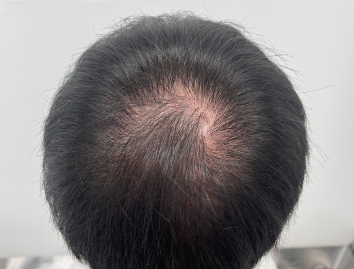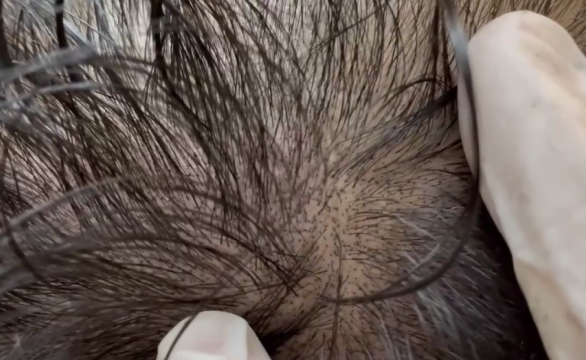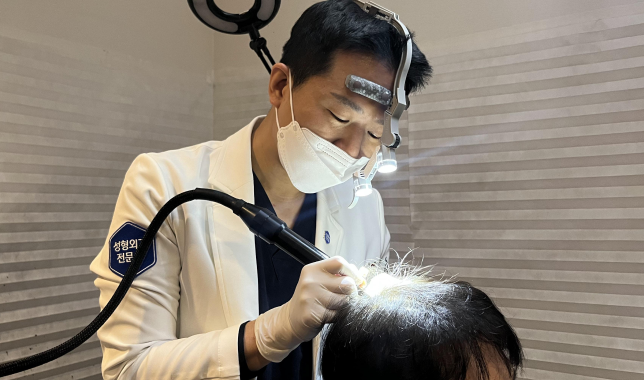NEWHAiR does the best SMP™
NEWHAiR hair loss coverage SMP™
NEWHAiR SMP™ conceals hair loss without surgery
NEWHAiR's unique technology preserves remaining hair without damaging follicles and fills in visible bald spots naturally.
Male SMP™


Female SMP™


Why NEWHAiR SMP™ is special
VS
Regular needle scalp tattoo
NEWHAiR needle-free SMP™
Pigment
Regular pigmented tattoos or semi-permanent
safe and recognized pigments
Procedure
The needle creates a small wound in the scalp to allow pigment to penetrate the dermis.
Pressure is used to inject pigment into the dermal layer without a needle.(First developed by NEWHAiR)
Advantages and disadvantages
May be easier if you have a bumpy scalp, such as a scarring.
When performed with a human hand and a needle, the results can be inaccurate and artificial, relying on the experience and know-how of the practitioner.
Digitally set depth, pressure, and spray frequency can be adjusted according to the individual, and it does not hurt the scalp, so there is less pain and bleeding.
Tends to be relatively time-consuming and can be difficult on bumpy surfaces such as scars.
pigmentation smudging
Smudging of pigment can occur over time* May vary depending on the practitioner's method and experience
Almost no smudging of pigment
Retouching
Average of 1-2 times
6-month retouching guarantee
Because SMP™ is not only dependent on the equipment used for the procedure, but also on the experience, know-how, and understanding of the practitioner, NEWHAiR offers consultations before and after scalp tattooing.
SMP™ is not like a regular tattoo.
It requires very detailed work. NEWHAiR, who has been working exclusively with hair loss for 17 years, even replicates the irregularities of hair.


Just as density is important in hair transplantation, so is density in SMP™.
We replicate the thickness, density, and irregularities of an individual's own hair to provide natural coverage for balding areas.
Misconceptions about SMP™

Misconceptions about SMP™ #1
Won't the procedure damage my scalp and hair follicles?
NEWHAiR verifies the condition of the patient's scalp before and during the SMP™ procedure.
The depth of the procedure is 0.8~1.5mm, which is just below the skin, and not 4~6mm, which is where the hair follicles are located, so there is no need to worry about damage to the hair follicles and scalp.


NO color change!


NO size change!
Misconceptions about SMP™ #2
Will I have smudging pigment or will it turn blue after the procedure?
A blue color or smudging is caused by a failure to adjust the pigment, the angle of treatment, and the size of the dots.
We use a concentration similar to the density and thickness of the individual's hair, our own proprietary pigment, and our own experience to prevent deformation.

Misconceptions about SMP™ #3
Does being under bright lights make it look more noticeable?
SMP™ should be prioritized to look natural at conversational distance to increase satisfaction.
If the dots are small, it may still look natural up close, but the person may be less satisfied with the procedure.
However, we will provide you with a personalized treatment after a thorough consultation to ensure that you get the look you want.

Misconceptions about SMP™ #4
Can't I get a hair transplant after SMP™?
Unlike regular tattoos, SMP™ is a superficial procedure, meaning it does not affect the scalp or hair follicles.
Therefore, you can have a hair transplant at any time after the procedure, and you can expect the positive effect of denser-looking hair if you have a hair transplant in the SMP™ treatment area.
NEWHAiR SMP™ head tattoo chosen by hair loss people
Hair loss changes with a mole Life Start a new life with a scalp tattoo.
Safe treatment
Don't worry. We'll diagnose your current hair condition and work at a safe depth, avoiding the hair follicle.
First to popularize SMP™
NEWHAiR has been recognized globally for its technology and safety, and was the first to popularize SMP™.
1:1 personalized treatment
We recreate the same color, same size, same density, and even irregularities of an individual's hair.
NEWHAiR advances
We believe that SMP™ is one of the most important hair loss treatments, and we never stop researching to improve its effectiveness.
To prioritize the satisfaction of patients New Hair is responsible for the end.
6-month guarantee
The NEWHAiR SMP™ program includes 6 months of follow-up care and retouching.
Due to the nature of the scalp, there is some variation in the response to SMP™ treatment results.
To address this, we offer a 6-month follow-up and retouching of any areas that are not satisfactory.
Since 2011
Presentation of SMP™ Procedure at the Korean Society of Plastic and Reconstructive Surgeons

2010
International Society of Hair Restoration Surgery FORUM
First SMP™ paper published in the FORUM

2013
SCIE Clinics paper published

2014
Wrote SMP™ chapter in World Hair Transplantation Textbook

2015
Published in the American Journal of Clinical and Aesthetic Dermatology





 Join
Join Login
Login


 EN
EN










 Effects of video confirmation
Effects of video confirmation